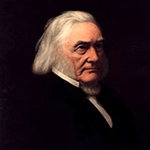
Samuel Nelson (1845-1872)
Samuel Nelson lived from 1792 to 1873.
Early Life
Nelson was born on November 10, 1792 in Hebron, New York. His parents were Scotch-Irish immigrants and his family operated a farm, which Nelson grew up on. Nelson attended the common schools in Hebron before receiving an additional three years of education in private schooling. Afterwards, he attended Middlebury College in Vermont.
Nelson graduated from Middlebury in 1813, at which point he decided to pursue a legal career. He began reading law at the firm of John Savage and David Woods in Salem, New York. Eventually, Nelson moved to Madison County and began his own legal practice with Woods. He specialized in real estate and commercial law, and managed to develop a very successful practice.
Legal Career
Nelson was appointed Postmaster of Cortland in 1820. That same year, he served as a presidential elector, voting for James Monroe and Daniel D. Tompkins. In 1821, Nelson acted as a delegate to the New York Constitutional Convention, where he supported the expansion of voting rights. At age 31, Nelson was appointed to serve on New York’s Sixth Circuit Court of Appeals. After eight years as a circuit court judge, Governor Enos Throop appointed Nelson to the New York Supreme Court. Nelson was recognized for using logic and common sense in his opinions, and staying out of partisan conflicts. His decisions were rarely appealed, and his success eventually earned him the position of Chief Justice. Nelson’s impressive reputation made him an ideal nominee for the Supreme Court of the United States.
Appointment to the Supreme Court
Nelson was nominated as an Associate Justice by President John Tyler to fill the vacant seat of Smith Thompson. The senate confirmed Nelson’s appointment after just ten days, on February 14, 1845. On the bench, Nelson continued to have a reputation of fairness and directness. His opinions were mostly uncontroversial, and he often aligned his votes with the majority.
Nelson specialized in admiralty law, contributing little to constitutional law. However, during the Dred Scott decision, Nelson agreed with the majority but believed the issue should be narrowed to a question of Missouri law. Nelson refused to accept the Civil War’s necessity. He famously dissented in the Prize Cases, arguing that President Lincoln’s blockade of southern ports was illegal. In Ex Parte Milligan, Nelson voted to overturn the conviction of a man who had been charged with assisting the Confederacy. Nelson also opposed the expansion of federal power, and supported reunion with the Confederacy. Nelson retired from the bench in 1872.
Death
Nelson died on December 13, 1873 in Cooperstown, New York. He is buried in Cooperstown’s Lakewood Cemetery.
Notable Cases
Dred Scott Decision (1857)
The Prize Cases (1863)
Ex Parte Milligan (1866)








